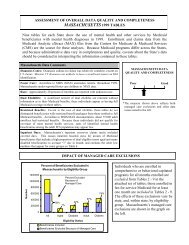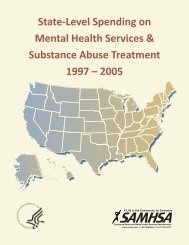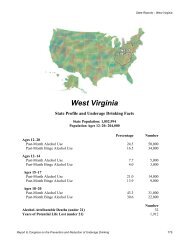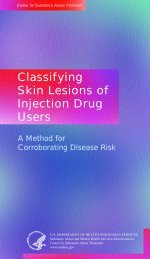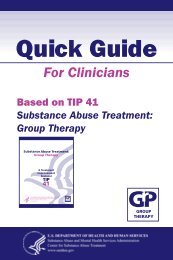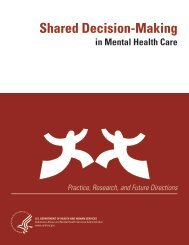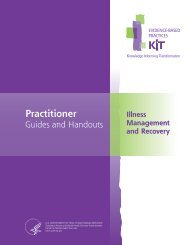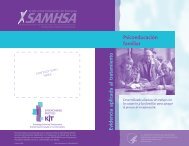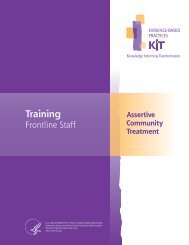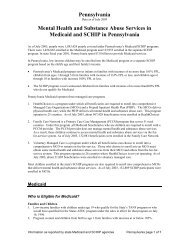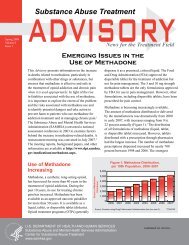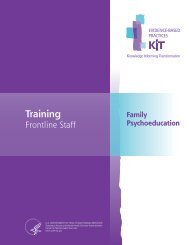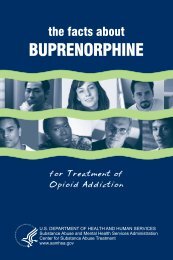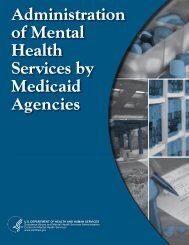TAP 21 - SAMHSA Store - Substance Abuse and Mental Health ...
TAP 21 - SAMHSA Store - Substance Abuse and Mental Health ...
TAP 21 - SAMHSA Store - Substance Abuse and Mental Health ...
Create successful ePaper yourself
Turn your PDF publications into a flip-book with our unique Google optimized e-Paper software.
Addiction Counseling Competencies<br />
Discussion<br />
Clinical supervisors, entry-level counselors, <strong>and</strong> most proficient counselors endorsed almost all<br />
1<strong>21</strong> competencies as important. However, the responses of each professional group also show<br />
relatively little discrimination among items <strong>and</strong> categories, which may account for the high<br />
Alpha coefficients. Given the large number of items in the survey, this level of consistency could<br />
indicate a substantial halo effect: that is, respondents could have been answering individual<br />
items on the basis of an overall impression <strong>and</strong> not making fine discriminations among the<br />
individual competencies.<br />
The results also indicate large gaps between what is needed <strong>and</strong> observed in proficiency for<br />
entry-level counselors, even among entry-level counselors themselves. Supervisors noted the<br />
greatest gaps, followed by the most proficient <strong>and</strong> entry-level counselors. Although the least experienced<br />
counselors reported the smallest gaps, the gaps were still substantial, indicating that<br />
what counselors know they need to do the job <strong>and</strong> what they can do are two different things.<br />
What accounts for supervisors’ ratings of entry-level proficiency being more critical than the<br />
other respondent groups? One possibility is a contrast effect. That is, supervisors may be using<br />
their own level of expertise as the st<strong>and</strong>ard for comparison resulting in unrealistically high<br />
expectations for entry-level counselors. In this instance, counselors with average proficiency<br />
would receive lower ratings against the supervisors’ higher st<strong>and</strong>ard representing significantly<br />
more experience.<br />
As a content validation strategy, the survey has limited value. Respondents were given 1<strong>21</strong><br />
statements to respond to, <strong>and</strong> little discrimination among the items was observed. However,<br />
all the competencies were perceived to be important, <strong>and</strong> the preparation for each was always<br />
reported as inadequate. Respondents appeared to address the list as a whole, rather than the<br />
individual competencies. Those who would embark on curricular change should do the same.<br />
That is, formal preparation for addiction counselors cannot just be bolstered here <strong>and</strong> there; it<br />
needs to be comprehensively redesigned.<br />
The main benefit of the survey results may be as a catalyst for curricular change. This has already<br />
proven to be the case. While the survey was being conducted, the Committee was already<br />
working on an exp<strong>and</strong>ed document that listed the knowledge, skills, <strong>and</strong> attitudes for each of<br />
the 1<strong>21</strong> competencies. Feedback from the field was obtained on the draft document. Then the<br />
International Certification <strong>and</strong> Reciprocity Consortium (ICRC) convened a national leadership<br />
group to assess the need for model addiction counselor training. After careful deliberation, the<br />
group concluded that much of the work to define such a curriculum st<strong>and</strong>ard had already been<br />
accomplished by the Committee <strong>and</strong> the ICRC in the Committee’s Addiction Counselor Competencies<br />
<strong>and</strong> the ICRC’s 1996 Role Delineation Study, respectively.<br />
Soon after, CSAT agreed to fund a collaborative effort to finalize a document that could be used<br />
as a national st<strong>and</strong>ard. CSAT convened a panel—The National Steering Committee for Addiction<br />
Counseling St<strong>and</strong>ards (NSC)—that comprised representatives from five national educational,<br />
certification, <strong>and</strong> professional associations. The NSC was successful in achieving unanimous<br />
endorsement of the Addiction Counselor Competencies—a milestone in the addiction counseling<br />
field. In 1998 CSAT published the results of this groundbreaking work as <strong>TAP</strong> <strong>21</strong>: Addiction<br />
Counseling Competencies: The Knowledge, Skills, <strong>and</strong> Attitudes of Professional Practice.<br />
194



